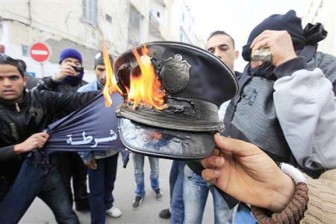TUNIS (Reuters) – Gunmen fired at random from cars in Tunis yesterday and inmates staged a mass jailbreak while leaders tried to prevent Tunisia from descending into chaos after the president was swept from power.

It was not clear who the assailants were but a senior military source told Reuters that people affiliated to former President Zine al-Abidine Ben Ali were behind the shootings.
Soldiers and tanks were stationed in the city centre to restore order in the aftermath of a night of looting that broke out when Ben Ali fled to Saudi Arabia following a month of violent anti-government protests that claimed dozens of lives.
The ousting of Tunisia’s president after widespread protests could embolden Arab opposition movements and ordinary people to challenge entrenched governments across the Middle East.
Speaker of parliament Fouad Mebazza, sworn in as interim president, asked Prime Minister Mohamed Ghannouchi to form a coalition government and the constitutional authorities said a presidential election should be held within 60 days.
The French government called on Tunisia to hold free elections as soon as possible and said it had taken steps to block suspicious movements of Tunisian assets in France.
Dozens of inmates were killed in the mass escapes from two prisons, gangs of men fired weapons randomly from speeding cars in the capital and clouds of black smoke hung over the city from torched buildings.
As night fell, a Reuters reporter said suburban neighbourhoods were being guarded from looters by impromptu militias, made up of residents armed with clubs and knives. They blocked neighbourhoods and only allowed local people to pass.
In a sign that Ben Ali’s rule was over, workers were taking down a portrait of the former president outside the headquarters of his RCD party on Mohamed V Avenue in the centre of Tunis.
“We are very happy to be free after 23 years of prison,” said Fahmi Bouraoui, drinking coffee in the Mozart cafe, one of a few businesses that reopened yesterday morning.
But his optimism could be short-lived as parts of the country descended into chaos.
Tunisian analyst Taoufik Ayachi said of the drive-by shootings, about 10 km (six miles) from the city centre on Saturday and in another suburb on Friday night:
“It is certain the presidential police are behind all this. They still hope to regain power.”
Dozens of inmates were killed when they broke out of Mahdia prison and the prison at Monastir, also south of the capital, was on fire after a separate escape attempt, witnesses said. “They tried to escape and the police fired on them. Now there are tens of people dead and everybody has escaped,” said a local man, Imed, who lives 200 m (yards) from Mahdia jail.
Forty-two people died in the Monastir riot, the official news agency said.
In suburban Tunis, the big Geant shopping centre was on fire, witnesses said.
State television showed footage of dozens of people who had been arrested for looting and violence. They had knives and double-barrelled shotguns and a small lorry stocked with stolen shoes, electrical equipment and a display mannequin.
In the suburb of Ariana, a crowd encircled four men who were shooting from the windows of a Ford jeep, somehow disarmed them and took them to the police.
Ghannouchi earlier confirmed reports that members of Ben Ali’s family had been arrested, but did not say who.
Al Jazeera television also reported that Ben Ali’s head of presidential security had been arrested.
Protesters have threatened to continue their campaign.
“We will be back on the streets, in Martyrs Square, to continue this civil disobedience until … the regime is gone. The street has spoken,” said Fadhel Bel Taher, whose brother was one of dozens of people killed in the protests.
The Eurasia Group consultancy said that without a definitive timetable for elections or a transitional government including opposition representatives, protests could continue: “Although the streets of Tunis are calmer than they have been in several days, Ben Ali’s departure is not likely to immediately defuse tension across the country.” The acting president on state television said he had asked the prime minister to form a coalition government.
“I have called on Mohamed Ghannouchi to form a new government of national unity,” he said.
An opposition leader who held talks with the prime minister on Saturday said there would be more negotiations today.




